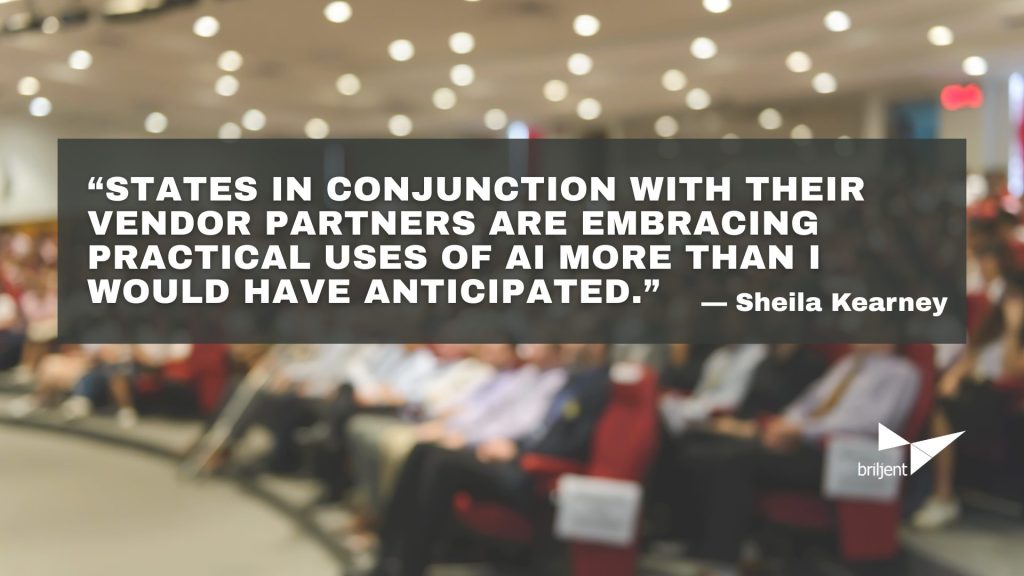March 2026
Meet Briljent's 2025 Adam Hayden Culture Award Winner
At Briljent, culture is not a slogan. It is how we show up for one another, our clients, and our communities. That is why we are proud to recognize Amber…


By Adam Hayden
At the 2025 State Health IT Connect Summit, Briljent’s Health Strategy and Innovation team observed a clear shift: AI is no longer experimental—it’s operational. States and vendors are scaling AI solutions like chatbots and code conversion, prioritizing data modernization for Medicaid Enterprise Systems (MES), and recognizing the urgent need for Organizational Change Management (OCM). This recap highlights how Briljent is helping clients align innovation with impact across health and human services.
“States in conjunction with their vendor partners are embracing practical uses of AI more than I would have anticipated.”
This insight from Sheila Kearney—shared during a debrief with our team—captures the spirit of this year’s Connect Summit. As Director of Health Strategy and Innovation, Sheila led our delegation through a packed agenda of sessions, panels, and networking events that revealed not only how quickly AI is being adopted in public sector work, but also how deeply it’s reshaping the way we think about modular systems, funding strategies, and data governance.
From conversations about Medicaid modernization to real-world demonstrations of AI-powered eligibility workflows, the summit made one thing clear: innovation is no longer aspirational—it’s operational.
The 2025 State Health IT Connect Summit showcased how states and vendors are embracing AI, data modernization, and cross-program integration to improve health and human services. Our team walked away with fresh insights into the future of Medicaid Enterprise Systems (MES), the evolving role of AI in eligibility and training, and the growing demand for organizational change management (OCM). This recap captures key takeaways from the event and how they align with Briljent’s Health Strategy and Innovation practice.
Our attendees observed a significant trend: states and their vendor partners are transitioning from AI pilot projects to practical, real-world applications. Examples include chatbots supporting Medicaid eligibility and AI-assisted code conversion for legacy systems, clearly indicating that AI is being implemented and scaled effectively. One notable session described how a state Medicaid agency and its IT vendor stabilized chatbot workflows and then expanded them to encompass provider enrollment. This demonstrated the benefits of reuse and policy alignment. By repurposing an established model across similar processes, they expedited implementation and ensured consistency—an approach that underscores the value of scalable and adaptable solutions.

As states modularize their Medicaid systems, the need for enterprise-level data governance is becoming increasingly urgent. Without a strong data strategy, it becomes difficult to generate meaningful insights across multiple systems and sources. For states and partners navigating this complexity, investing in data modernization is essential to ensure transparency, accountability, and informed decision-making at every level.
A recurring theme throughout the summit was the growing integration of data across health and social service programs. States are exploring new ways to connect these systems to better understand and address social determinants of health. For agencies and partners working at this intersection, the ability to unify and analyze data across programs is becoming essential to delivering more coordinated, person-centered care.
Beyond operations, AI is beginning to play a role in areas like training delivery and program integrity. One session emphasized how we use AI today will shape its future impact, highlighting the importance of ethical, human-centered design. For example, some states are exploring how generative AI could support onboarding and training for eligibility workers, helping them navigate complex systems more efficiently. These early use cases suggest that AI, when thoughtfully applied, can enhance—not replace—human expertise in critical service areas.
Organizational change management (OCM) emerged as a consistent gap across conversations. Many attendees shared that while technology investments are accelerating, the people side of change often lags behind. Several discussions highlighted the need for structured OCM support to bring coherence to system modernization efforts—an area where thoughtful planning and communication can make or break implementation success. In fact, we’re publishing posts regularly on this very topic!
As Briljent continues to expand its Health Strategy and Innovation practice, the insights from this summit reinforce our direction. From AI to data governance to OCM, we’re well-positioned to help clients navigate the future of health and human services with clarity and confidence.
Briljent’s Health Strategy and Innovation Team helps clients navigate the complexity of healthcare transformation by combining deep policy knowledge with human-centered design. With experience supporting state and federal health initiatives, the team delivers strategic consulting, funding guidance, and implementation support to modernize systems and improve outcomes. We partner with clients to align innovation with impact—ensuring that technology, data, and people work together to advance the future of health and human services.
Briljent is a Woman-owned Business Enterprise (WBE) specializing in human-centric professional services to optimize performance, systems, and data. Since 1998, Briljent has engaged with people to understand their challenges and develop strategies to help them adapt to new policies, systems, and programs. We support everything surrounding the successful funding, planning, and implementation of new initiatives through training, organizational change management, health strategy and innovation consulting, project management, and staffing solutions.
March 2026
At Briljent, culture is not a slogan. It is how we show up for one another, our clients, and our communities. That is why we are proud to recognize Amber…

February 2026
Earlier this month, we gathered with family and friends to celebrate the life of our dear colleague and friend, Adam Hayden. Adam passed away in December after living nine years with a terminal glioblastoma…

October 2025
When my Medicaid renewal came up, I was worried about losing coverage. But the process was smooth, and the staff seemed confident and helpful. It made all the difference. Across…
